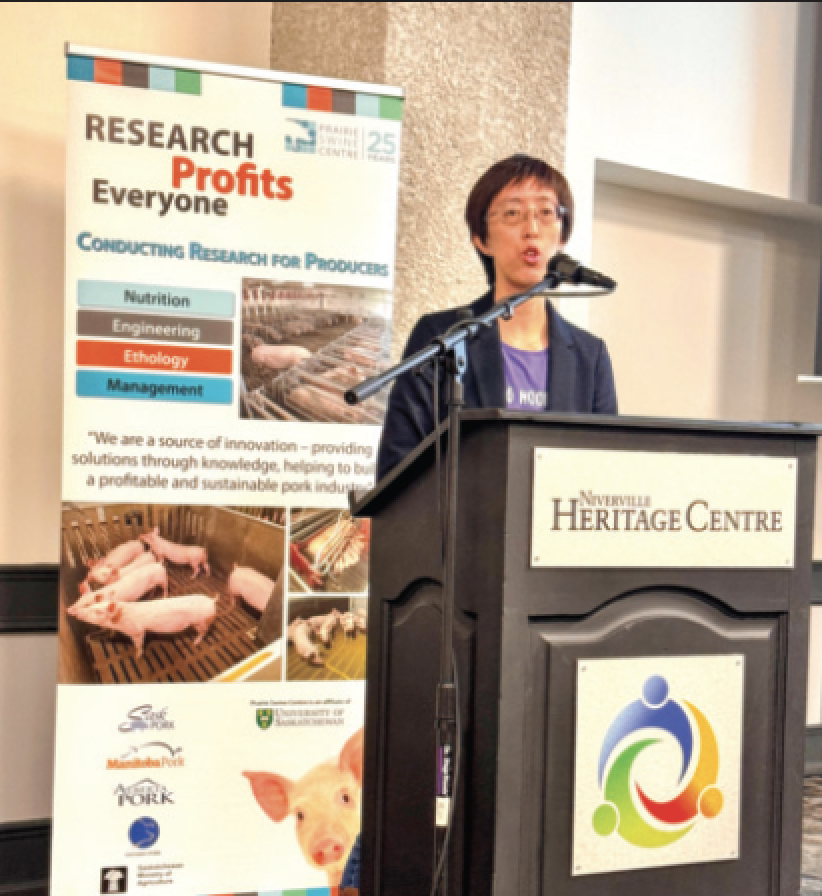
The Prairie Swine Centre is prioritizing more research to help Canadian pork producers adapt to upcoming changes to the Pig Code of Practice. Dr. Jen-Yun Chou, appointed Research Scientist in Ethology at the centre in March 2024, is building on the foundational work of Drs. Yolande Seddon, Jenifer Brown, and Harold Gonyou.
Operating under the University of Saskatchewan, the Prairie Swine Centre generates and shares knowledge through original research, scientific reviews, and economic analysis of the pork sector. “Consumers and the general public are increasingly focused on how food production impacts animal health and the environment,” said Dr. Chou. These priorities will guide the centre’s work in supporting farmers as they navigate evolving industry standards and consumer expectations.
She outlined key priorities to improve animal welfare and productivity while helping producers comply with Canada’s updated Pig Code of Practice. “Our primary focus is to enhance the rearing environment to improve animal welfare and productivity, particularly in transitioning to group housing for sows.”
Current projects involve commercial partners collaborating to address sow performance in various group housing types and refine related management practices. “We’re also working on an enrichment project to explore what makes effective enrichment and how it can improve welfare and performance,” Dr. Chou noted. These findings will be integrated into the upcoming code of practice updates, ensuring producers know how to meet new standards while advancing animal care.
Attitudes toward animal welfare have evolved significantly among the general public and farmers, driven by growing awareness of food safety, environmental sustainability, and advancements in animal welfare science. Dr. Jen-Yun Chou, who has worked extensively across Europe, North America, and East Asia, observed increasing public concern about how food is produced, including the treatment of animals on farms.
“In East Asia, for example, food safety has always been a major focus, which extends to how producers raise their animals. Similarly, farmers and the general public are showing greater care for animal health and welfare,” Dr. Chou explained. She also noted that concerns about the environmental footprint of food production and its impact on sustainability have further amplified interest in animal welfare practices.
The rapid development of animal welfare science over recent decades has provided valuable tools and insights into understanding animal behaviour and needs. “We now have more knowledge and better tools to ensure good welfare, and this information is being shared through various channels like social media, making it accessible to a broader audience,” Dr. Chou said.
Advancing Animal Welfare: Focus on Group Housing and Long-Term Solutions
Dr. Jen-Yun Chou emphasized that transitioning Canadian producers toward group housing remains a top priority, aligning with the targets set by the Pig Code of Practice. “We want to help producers achieve what the code has outlined, ensuring a successful transition to group housing,” Dr. Chou stated.
Looking further ahead, Dr. Chou highlighted the need to reduce specific routine interventions, such as castration, tail docking, and teeth reduction, which are labour-intensive and impact animal welfare. “These procedures are there for a reason, but reducing them could improve welfare while easing the farm labour burden. However, it’s critical to ensure we can still effectively manage animals if we phase out these interventions,” she explained.
Dr. Chou also stressed the importance of longitudinal monitoring and bench-marking welfare to better understand the relationship between welfare and performance. “We need to show that welfare benefits not only the animals but also the producers. This understanding can encourage a broader adoption of welfare-focused practices,” she said.
An often-overlooked area of behavioural welfare research that interests Dr. Chou is the welfare of animals during transport and slaughter. “This aspect is critical and deserves more attention to ensure comprehensive improvements in animal welfare,” she concluded. These efforts highlight a forward-looking approach to balancing ethical practices, animal health, and producer needs in the evolving agricultural landscape.
Improved animal welfare benefits animals, producers, and consumers, creating a more sustainable and trusted industry. Better welfare practices enhance livestock’s health and quality of life while also increasing productivity and profitability for producers by improving performance.
Consumers gain from safer food production, reduced antibiotic use, and higher-quality meat, fostering greater trust in the agricultural sector. Dr. Jen-Yun Chou highlighted that these advancements strengthen the industry’s social license to operate and position countries like Canada as global leaders in ethical and sustainable agriculture.
By prioritizing animal welfare, the entire industry moves toward a future where humane practices benefit all stakeholders. •
— By Harry Siemens





